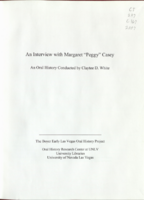Search the Special Collections and Archives Portal
Search Results
Gene Leavitt oral history interview
Identifier
Abstract
Oral history interview with Gene Leavitt conducted by his son, Monte Leavitt, on February 28, 1979 for the Ralph Roske Oral History Project on Early Las Vegas. In this interview, Mr. Leavitt talks about his career as a truck and bus driver. He also talks about the life in Southern Nevada, the soldiers stationed here, and gambling. Leavitt also briefly discusses doing drilling work on the Boulder (Hoover) Dam.
Archival Collection
Rena Lees oral history interview
Identifier
Abstract
Oral history interview with Rena Lees conducted by Bill Young on March 19, 1978 for the Ralph Roske Oral History Project on Early Las Vegas. In this interview, Lees talks about her experience living in Las Vegas, Nevada from the 1930s to 1950s. She specifically talks about growing up in Las Vegas and the mob's influence throughout the city. She also discusses her family and her career working at Sunrise Hospital.
Archival Collection
Mildred Bardy oral history interview
Identifier
Abstract
Oral history interview with Mildred Bardy conducted by Deborah Grant on March 11, 1981 for the Ralph Roske Oral History Project on Early Las Vegas. In the interview Bardy discusses the famous celebrities who would come to purchase clothing at the specialty clothing department store where she worked, as well as the costumes that were made there for the Helldorado Parade. Bardy also discuss some of the changes in Las Vegas over time, particularly the changes in fashion styles.
Archival Collection
Chris Bianchi oral history interview
Identifier
Abstract
Oral history interview with Chris Bianchi conducted by David Schwartz on April 14, 2015 for the Table Games Management Oral History Project. In this interview, Bianchi discusses his career as a pit boss and his overall career in gaming. Bianchi then discusses the procedures that a pit master must follow, and how strictly these procedures were enforced. Lastly, Bianchi discusses how to motivate players, the positive aspects of being a card dealer, including different competitions that he worked.
Archival Collection
Elliott Schecter oral history interview
Identifier
Abstract
Oral history interview with Elliott Schecter conducted by David Schwartz on May 27, 2015 for the Table Games Management Oral History Project. In this interview, Schecter discusses his career as a card dealer at various casinos, including Seminole Hollywood, Downstream Casino Resort, Snoqualmie Casino, Reno Hilton, and the Palms in Las Vegas. Schecter also discusses card dealing in cruise ships, including Discovery cruises, the Palm Beach Princess, and the Palm Beach Kennel Club.
Archival Collection

Interview with Robert Nelson, June 30, 2004
Date
Archival Collection
Description
Text
Ralph Denton oral history interview
Identifier
Abstract
Oral history interview with Ralph Denton conducted by K.J. Evans on January 10, 2000 for the Las Vegas Review-Journal First 100 Oral History Project. Denton first talks about his personal friendship with Governor Grant Sawyer, their education in law school, and his eventual work on campaigning for Sawyer after he became governor. Denton then speaks about working as Sawyer’s adviser. Toward the end of the interview, Denton describes his work on improving civil rights and some of the challenges that came with that.
Archival Collection
Janis Walker oral history interview
Identifier
Abstract
Oral history interview with Janis Walker conducted by Claytee D. White on July 03, 2006 for the Boyer Early Las Vegas Oral History Project. In this interview, Walker discusses her career as an African American showgirl in Las Vegas, Nevada during the 1970s and 1980s. Walker describes dancing in the MGM Grand Hotel and Casino productions of
Archival Collection

Interview with Vernon Henry Jones, October 4, 2005
Date
Archival Collection
Description
Text

Transcript of interview with Peggy Casey by Claytee D. White, January 13, 2005
Date
Archival Collection
Description
Text
